T. Belman. This movement calls for resettling Gaza in the north. I go further. Israel should empty out the north 80% of Gaza of all Gazans and annex the same. To just reestablish Gush Katif, will leave us with the same problems that got us to leave in 2005.
There is no legal or historical basis that favours the Gazans mkeeping Gaza. Gaza is simply a big refugee camp in Israel
As some supporters cite ideology and others defense needs, a coalition forms after Hamas’s October 7 massacre with the goal of renewing Jewish presence in the Strip, gone since 2005
Though US President Joe Biden said it would be a “big mistake” and Prime Minister Benjamin Netanyahu called the idea “unrealistic,” hundreds of activists at an Ashdod gathering in late November called for reestablishing Jewish settlements in the Gaza Strip following the October 7 massacre orchestrated by Hamas.
“I call from here to all the ministers of the government and to their head, the prime minister — make your voices heard now, lift up your heads,” declared Yossi Dagan, head of the Samaria Regional Council, to robust applause.
“Let it be known that you support the appeal to renew Jewish settlement throughout all of the Gaza Strip. The nation is waiting for you,” he said.
Dagan, 43, led a successful campaign that culminated in a March 2023 Knesset vote that annulled part of the 2005 Disengagement Law — the part that forbade Jewish settlements in northern Samaria. Now, he’s leading a coalition of 11 mostly grassroots organizations with thousands of volunteers whose aim to annul the main part of the law — the part that saw Israel “disengage,” or unilaterally withdraw its troops and its civilian settlers, from Gaza.
For those both inside Israel and out who still support a two-state solution, the idea seems unrealistic and counterproductive.
Many Israelis also remember the difficulty of justifying, up till 2005, the deployment of a large contingent of IDF soldiers to protect the relatively tiny number of Israeli residents in Gaza — just 8,600 compared to a Palestinian population of 1.7 million at the time.
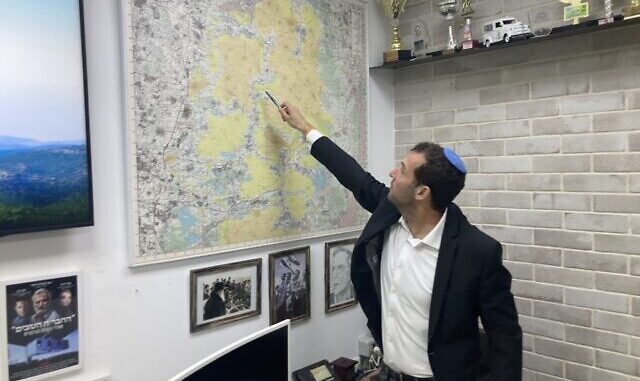
But based on Israeli opinion polls, anecdotal evidence and conversations with Israeli military experts, some form of resettlement of Gaza is seen as a realistic option and enjoys a certain amount of support — particularly among Israelis who define themselves as right wing.
On October 7, thousands of terrorists burst through the Gaza border fence in a shock attack and rampaged murderously through nearby Israeli communities, killing some 1,200 people amid horrific acts of brutality and taking over 240 hostage to Gaza.
To the crowd that gathered in an event hall in Ashdod on November 22, it was self-evident that an Israeli return to Gaza is needed to create a deterrent and to improve security in the south.
“Right after the attack, it was clear to me that [resettling Gaza] was what should happen next,” said 16-year-old Shlomo Elyashiv Fendel. “I was thinking that people would take action and I would join them, but I didn’t feel as though something were happening.”
Fendel said he joined a group that was “passing out orange ribbons” — a reference to the symbol of the anti-disengagement movement in the months that led up to the 2005 disengagement from Gaza and northern Samaria.
Now one of the leaders of Returning Home — part of the 11-organization coalition led by Dagan — Fendel said that while the movement may appear to consist largely of young people, that was not always the case. Shortly after the October 7 onslaught, he said, many WhatsApp groups calling for resettling the Gaza Strip were managed by older people.
“There was a man on reserve duty, a mother of three, a 60-year-old grandfather,” said Fendel. “But since then lots of younger people have joined.”
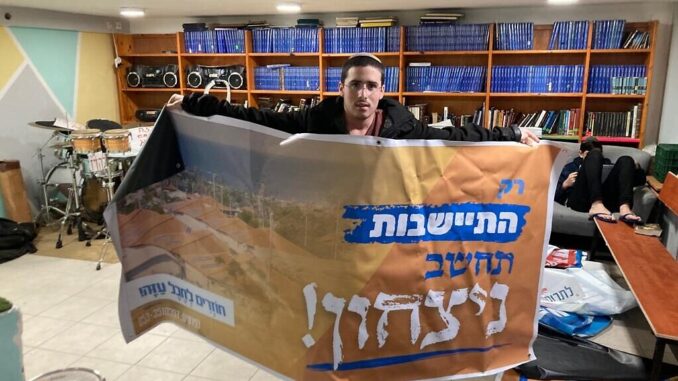
The campaign launch
Except for a smattering of men without kippot and women in pants, the crowd that gathered in Ashdod on November 22 to launch a nationwide campaign to resettle Jews in Gaza wore religious garb. Orange ribbons and orange T-shirts were prominent.
Besides Dagan, speakers at the conference included backbench Likud MKs Ariel Kellner and Tally Gotliv, settlement activist and former Kedumim mayor Daniella Weiss, and Avraham Schrieber, former rabbi of Kfar Darom — one of the 21 Jewish communities in Gaza dismantled and evacuated in August 2005.
The speakers were brought in by groups with varying agendas but united in the goal of reestablishing Jewish communities in Gaza.
Otzma Yehudit MK Limor Son Har-Melech, who, like Dagan, was evacuated from one of the four Israeli settlements in northern Samaria that were dismantled as part of the 2005 disengagement, told the crowd that reinstating Israeli communities in the Gaza Strip was a security necessity.
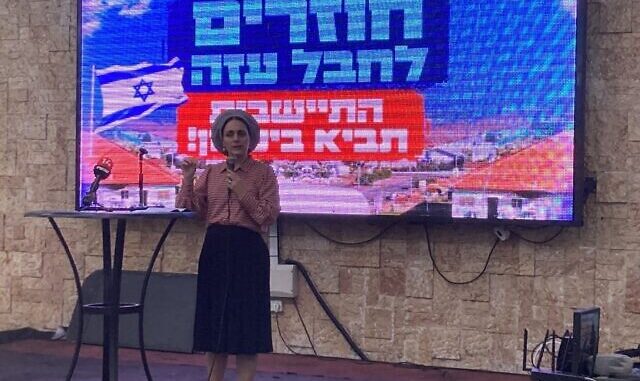
“Today, every citizen in the State of Israel knows that to restore security to the South, to remove from common parlance the words ‘rocket’ and ‘red alert,’ to give back to each and every child a sense of security, there is no choice but to reassert full control over Gaza,” she said.
Son Har-Melech and the other speakers represent a far-right constituency within Israeli society.
So does Heritage Minister Amichai Eliyahu of the Otzma Yehudit party, a minister in Netanyahu’s government who openly advocated for the return of Jewish settlements to Gaza.
Eliyahu is infamously known for recently bringing up the idea of dropping a nuclear bomb on Gazans.
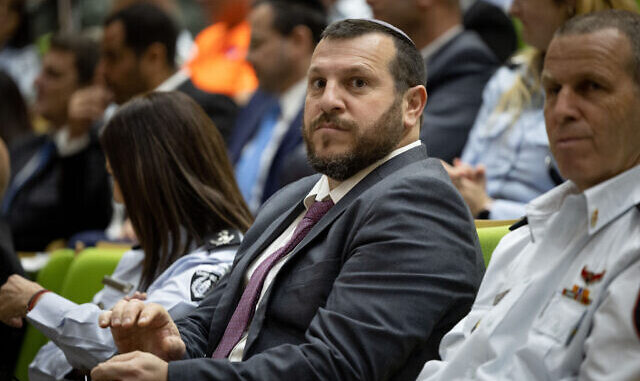
Higher-ranking politicians in Netanyahu’s government have been more reticent about resettling Gaza. Both Education Minister Yoav Kisch and Transportation Minister Miri Regev have blamed the 2005 disengagement from Gaza for the October 7 attack, but have refrained from calling for a renewal of settlement there.
But this reticence might be a tactical omission rather than a principled stance.
On November 20, when asked by reporters at a Religious Zionism faction Knesset meeting about reinstating settlements in Gaza, Finance Minister Bezalel Smotrich said, “It’s not the time to deal with this,” and “What we do afterward on the civilian side, we’ll argue about it later.”
And Diaspora Affairs Minister Amichai Chikli went further in a November 19 interview with Kol Chai, a radio station catering to the religious public, after being asked about the future of Gaza.
“It could be that you and I, who belong to the nationalist camp, have very clear ideas on what should unfold there after the war. But now is not the time to articulate these ideas,” Chikli said.
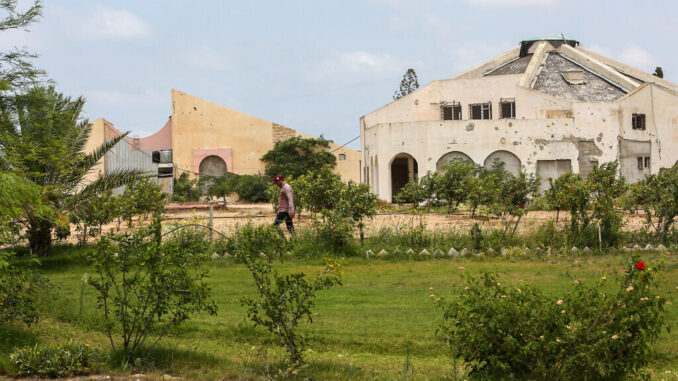
On November 11, Netanyahu called the notion of resettling Gaza “unrealistic” but said that he’s driven by security considerations, claiming to “want overall security control” in a “demilitarized Gaza.” He also told Fox News on November 8 that “we don’t seek to occupy, but we seek to give it and us a better future in the entire Middle East.”
While the prime minister has been clear on who he does not want running Gaza after the war — the Palestinian Authority and, of course, Hamas — he has remained vague on whom he envisions taking control there.
Too early to plan for Israeli settlements in Gaza, but…
Brig. Gen. (res.) Amir Avivi, deputy commander of the IDF’s Gaza Division in 2010-2011, argues that resettling the Gaza Strip is the only way to ensure Israel’s security in the long term. (I TOTALLY AGREE,)
“Where there is a strong continuum of settlements there is security; where there are no settlements there is no security,” said Avivi, founder and CEO of the Israel Defense and Security Forum (IDSF), a security advocacy group with 16,000 members and dozens of reserve-duty generals.
Avivi, who held the roles of commander of the IDF’s Sagi Division, commander of Battalion 605, and commander of the School of Combat Engineering, said the October 7 attack proves separation from the Palestinians is not a viable option.
He also rejected the position presented by the Netanyahu government that in the coming years Israel can retain military control over the Gaza Strip, either by maintaining IDF forces inside Gaza or conducting regular incursions, as is the case in Palestinian population centers in the West Bank such as Jenin and Nablus.
“My way of thinking and the thinking of the IDSF is for generations ahead. I think 100 years ahead. And I know now already that if the State of Israel in its broadly strategic, Land-of-Israel thinking — including Gaza — does not create settlements, in another five years, another 10 years, another 20 years, the Four Mothers of that generation will stand up and say, ‘Excuse me, why are we wasting our time making arrests in Gaza or in Rafah?’” Avivi said.
Avivi was referring to the “Four Mothers” anti-war protest movement that successfully lobbied for Israel’s unilateral withdrawal in May 2000 of military personnel from South Lebanon.
Avivi said that Israel’s experience in southern Lebanon, and the US’s experience in Iraq and Afghanistan, teach that it is untenable to maintain military control alone without a large civilian population inhabiting the hostile area, traveling its roads, and providing the military with a rationale for maintaining order.
He adds that it is still too early to plan for Israeli settlements in Gaza.
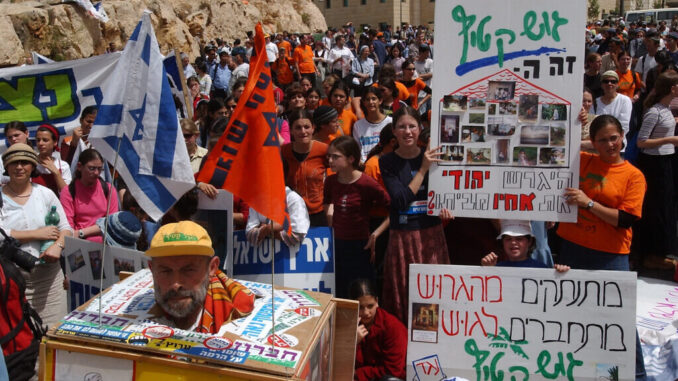
“We don’t know how many Gazans will remain, how many will agree to move out and be relocated. We don’t know what Gaza will look like after the war,” he said. “But it’s clear to me that if the residents of Be’eri want their grandchildren to be safe, there has to be a strong continuum of Jewish settlements in the Gaza Strip.
“And I think people on the left are the ones who should settle there, so the project doesn’t end up belonging solely to the religious right,” added Avivi, who said he grew up secular but feels strongly connected to the traditions, history and spirit of the Jewish people.
Still, Avivi believes prudence now dictates refraining from public declarations about such plans.
“You don’t want to cause an internal dissent in the IDF and in Israeli society, and you don’t want to hurt our relations with the US,” he said.
Meanwhile, Dagan, who helped found one of the largest lobbying groups in the Likud Party’s central committee, believes now is exactly the time to discuss resettling Gaza.
“Everybody is talking about what to do with Gaza,” said Dagan. “So we should too. The US wants to put the Palestinian Authority in charge. These are people who are no different from Hamas. Hamas are Nazis that wear a green ribbon on their heads and the Fatah are Nazis in suits. So we should present our own vision.”
Unprecedented groundswell of support
According to a Channel 12 survey, 44% of respondents supported reestablishing Israeli settlements in Gaza, with 39% opposing the move and 17% undecided. Among self-defined proponents of Netanyahu’s right-wing bloc, 68% supported the move.
Asked specifically about what the endgame in Gaza should be, 32% of respondents — the single largest group — said Israel should remain in Gaza permanently and reestablish Jewish settlements there, while 30% said responsibility should be transferred to the international community and 14% said only Israel’s military should remain in Gaza.
Just 10% supported transferring control of Gaza to the Palestinian Authority, which Biden referred to as a favorable outcome in a November 18 op-ed for The Washington Post.
The poll, conducted on November 16, was based on 502 respondents and had a margin of error of 4.4%.
Dozens of pictures have circulated on social media of IDF soldiers in Gaza holding signs calling for a return.
A video clip of popular singer, songwriter and composer Hanan Ben Ari went viral in which Ben Ari can be seen entertaining soldiers preparing to go into Gaza.
“We’re going back to Gush Katif… we’ll establish Nova beach on the Gaza shore,” sang Ben Ari, referring to the Nova rave festival, which Hamas transformed into a killing field where 364 partygoers were massacred, many of them after being tortured, mutilated and raped, and others were taken hostage.
A crowd of soldiers danced, raised their arms and sang along with Ben Ari.
A similar video went viral in which pop singer Narkis, who was ousted in 2005 with her family from the Gaza settlement Netzer Hazani, sang the same song, based on a classic melody of the Chabad Hasidic sect.
And in the wake of the October 7 massacre, many Israelis, shocked by the brutality of the attack and by the broad support for it among Palestinians in Gaza and the West Bank, have given up hope of cooperation with the Palestinians. As a result, solutions such as transfer-by-consent of Palestinians to locations outside Gaza and reestablishing Jewish settlements in Gaza have gained support.
An opinion poll conducted by Birzeit University’s Arab World for Research and Development found that 59.3% of Palestinians in Gaza and the West Bank “strongly supported” the October 7 attack, and 15.7% “somewhat supported” it. Another 10.9% “neither supported nor opposed” the attack.
When asked what solution they saw for the Israeli-Palestinian conflict, 74.7% of Palestinian respondents in the West Bank and Gaza replied, “A Palestinian state from the river to the sea.”
The poll is based on 668 respondents, 277 in Gaza and 391 in the West Bank.
‘Totally unrealistic, illogical and dangerous’
Kobi Michael, a senior researcher at the Tel Aviv-based Institute for National Security Studies, has no faith in the Palestinian leadership. He also believes Israel should leave in ruins the northern part of Gaza, including Gaza City.
At the same time, he sees the renewal of Israeli communities in Gaza as “totally unrealistic, illogical and dangerous.”
“The US administration would never accept it and it would create a rift between us and the Americans and expose us to tremendous international pressures,” said Michael, who served on Israel’s National Security Council as the head of the Palestinian Division and in a similar position as the deputy director-general in the Strategic Affairs Ministry between 2009 and 2013.
Michael said the move would also reawaken the vicious political divisiveness that threatened to tear Israeli society apart in the months leading up to October 7.
“There is a consensus now as a result of the war. But if we try to renew settlements we will destroy that consensus,” he said.
Strategic timing necessary
Aviel Tucker, who was evicted from Netzer Hazani in 2005, is in favor of reestablishing Jewish settlements in Gaza, but is concerned that pushing aggressively and publicly will reignite dissent.
“Although I appreciate what other activists are doing, I think the way to campaign is not to shout from the rooftops,” said Tucker, who lives in the new Netzer Hazani, reestablished near Moshav Yesodot east of Ashdod in 2010 by evacuees of the old community and bearing the same name.
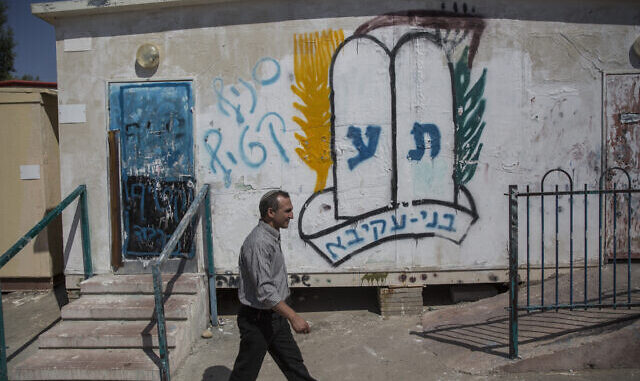
Tucker said that since October 7 he and others have been meeting with members of regional councils and community leaders along the Gaza border and with IDF officers in an attempt to put together a coherent and practical plan.
“The idea is not to redo what existed in 2005, but rather do something bigger, to create a Jewish city there, to create an industrial center there, and to relaunch Jewish agricultural projects there,” said Tucker.
Central to the success of the plan for renewed Jewish presence in Gaza, said Tucker, is the building of a broad coalition among diverse segments of Israeli society.
He hopes an ideological shift in the wake of the October 7 attack will help him garner support among existing Gaza border communities, many of which are secular and left wing.
“Even in places like Be’eri, I’m hearing people sound more extreme than me in their political views,” said Tucker.
But Tucker admitted plans are still in the very beginning stages.
Alon Pauker, spokesman for Kibbutz Be’eri, one of the kibbutzim hardest hit by Hamas’s vicious attack, said the very idea that Israelis are suggesting rebuilding Jewish communities in Gaza is “maddening.”
“It’s like having a bonfire and you’ve finally managed to start putting out the fire and now you pour gasoline on it and start the whole thing over again,” Pauker said.
Pauker, a historian of Zionism and lecturer at Beit Berl College, said there was a pressing need to re-educate the Palestinians of Gaza, who are influenced by Hamas, an organization “somewhere between ISIS and the Nazis.”
“But certainly we don’t want to stick a finger in their eye by rebuilding [Israeli] communities in Gaza,” added Pauker.
Ultimately, Pauker sees dialogue with the Palestinians as the only option, though he admits it could take a very long time before they are ready.
‘It’s what the nation wants’
For Fendel, the main motivation to return to Gaza is religious.
“People think it is not realistic to go back,” said Fendel, son of Rabbi David Fendel, the head of a large religious Zionist yeshiva in Sderot close to the border with Gaza. “But I think it’s not realistic to expect that it will not happen. It can’t be that we received such a terrible blow and there won’t be something positive from it.
“As it says, ‘It is even the time of Jacob’s troubles, but he shall be saved out of it,’” added Fendel, quoting from a passage in the book of Jeremiah discussing a prophecy about the Jewish people’s return to its land after the Babylonian exile. “It has to come to be.”
Fendel is connected to lists of whatsApp groups with thousands of activists and a spreadsheet with a list of some 150 towns and settlements throughout the West Bank where headquarters will be set up in each to market the idea of rebuilding Gaza’s Jewish communities.
He and his friends, fellow students at Mercaz Harav High School in Jerusalem, have printed 3,500 T-shirts proclaiming “Returning Home” along with 10,000 fliers, and ordered hundreds of meters of orange ribbon.
Fendel played a voice message from his brother, an IDF doctor presently serving on the front line in Gaza, that said, “There is a huge demand for ribbons here, please send more.”
Fendel said that one of his objectives is to create the organizational infrastructure to be able to mobilize activists when they are needed.
“We’re trying to create the networks so that when the time comes and Israel decides to pull troops out of Gaza, we can quickly organize a large demonstration,” Fendel said.
Dagan said he was convinced there is a majority in the present government in favor of resettling Gaza, “because that’s what the nation wants.”
“What else can you offer people whose families were slaughtered?” said Dagan. “What else can you offer an entire nation that is traumatized, that is shell-shocked? To people sleeping with handguns under their pillows in Petah Tikva and Hadera?”
“Resettling there will be a deterrent to future terrorist attacks and will strengthen Israel’s security,” he said. “Eliminating Hamas is the beginning, but what will give us long-lasting security is settlements.”



Leave a Reply
You must be logged in to post a comment.